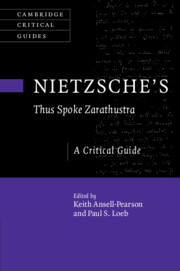Book contents
- Nietzsche’s Thus Spoke Zarathustra
- Cambridge Critical Guides
- Nietzsche’s Thus Spoke Zarathustra
- Copyright page
- Epigraph
- Contents
- Contributors
- Acknowledgments
- Note on Texts, Translations, and References
- Abbreviations
- Introduction
- Chapter 1 Laughter As Weapon
- Chapter 2 Philosophy As a Way of Life in Thus Spoke Zarathustra
- Chapter 3 What Makes the Affirmation of Life Difficult?
- Chapter 4 Zarathustra’s Response to Schopenhauer
- Chapter 5 Nietzsche’s Naturalism and Thus Spoke Zarathustra
- Chapter 6 Nietzsche’s Solution to the Philosophical Problem of Change
- Chapter 7 Zarathustra’s Moral Psychology
- Chapter 8 Zarathustra’s Great Contempt
- Chapter 9 The Great Politics of Thus Spoke Zarathustra
- Chapter 10 Joyful Transhumanism
- Chapter 11 Nietzsche on the Re-naturalization of Humanity in Thus Spoke Zarathustra
- Bibliography
- Index
- Cambridge Critical Guides
Chapter 5 - Nietzsche’s Naturalism and Thus Spoke Zarathustra
Published online by Cambridge University Press: 09 June 2022
- Nietzsche’s Thus Spoke Zarathustra
- Cambridge Critical Guides
- Nietzsche’s Thus Spoke Zarathustra
- Copyright page
- Epigraph
- Contents
- Contributors
- Acknowledgments
- Note on Texts, Translations, and References
- Abbreviations
- Introduction
- Chapter 1 Laughter As Weapon
- Chapter 2 Philosophy As a Way of Life in Thus Spoke Zarathustra
- Chapter 3 What Makes the Affirmation of Life Difficult?
- Chapter 4 Zarathustra’s Response to Schopenhauer
- Chapter 5 Nietzsche’s Naturalism and Thus Spoke Zarathustra
- Chapter 6 Nietzsche’s Solution to the Philosophical Problem of Change
- Chapter 7 Zarathustra’s Moral Psychology
- Chapter 8 Zarathustra’s Great Contempt
- Chapter 9 The Great Politics of Thus Spoke Zarathustra
- Chapter 10 Joyful Transhumanism
- Chapter 11 Nietzsche on the Re-naturalization of Humanity in Thus Spoke Zarathustra
- Bibliography
- Index
- Cambridge Critical Guides
Summary
Meyer discusses the intensely debated topic of Nietzsche’s philosophical naturalism and thinks that the key is Nietzsche’s study of Schopenhauer. For Meyer Nietzsche’s argument has to do with completing the project of naturalism that Schopenhauer thinks cannot be completed. Meyer thinks that Nietzsche’s naturalism in TSZ leads him to endorse the truth of cosmological eternal recurrence and that this truth entails for Nietzsche a kind of fatalism that leads us beyond a morality of good and evil and beyond the conception of agency that underlies this morality. Meyer thinks that Nietzsche constructed a narrative in which Zarathustra comes to abandon his non-naturalized conception of himself and his agency, thereby attaining a childlike state of innocence beyond good and evil.
- Type
- Chapter
- Information
- Nietzsche's ‘Thus Spoke Zarathustra'A Critical Guide, pp. 104 - 124Publisher: Cambridge University PressPrint publication year: 2022
- 2
- Cited by

